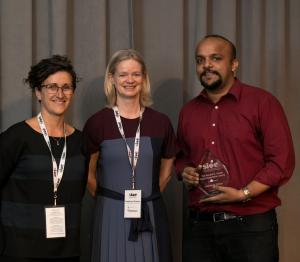By Federica Carugati, Claudine Gartenberg, Catherine Thomas, and Mariana Prado
The 2022 Ronald H. Coase dissertation award committee selected four outstanding finalists from a pool of excellent applicants. The committee members (Federica Carugati, King’s College London, Chair; Claudine Gartenberg, University of Pennsylvania; Catherine Thomas, London School of Economics; and Mariana Prado, University of Toronto) are grateful to all the students who submitted their dissertations and to the advisors who wrote on their behalf.
Honorable mentions, in alphabetical order
Augustin Bergeron (Harvard University) receives an Honorable Mention for his dissertation “Essays in Development Economics.” Augustin’s dissertation focuses on the Democratic Republic of the Congo to explore two important topics in the political economy of development: the sources of fiscal capacity building and the institutional determinants of cultural traits. Drawing on experimental evidence, the first three chapters seek to assess the effects of delegating tax collection to state agents or local elites; of improving the assignment of tax collectors; and the complementary roles of tax rates and tax enforcement on identifying revenue-maximizing tax rate. The fourth chapter traces the persistent effect of historical exposure to Christian missions on individual attitudes toward group members. Each chapter is, in and of itself, a significant contribution to the literature and the committee was particularly impressed by the sophistication of the experimental designs.
Mark Hup (UC Irvine) receives an Honorable Mention for his dissertation “Essays on Fiscal Modernization, Labor Coercion, State Capacity and Trade”. His research of the economic history of state taxation in Dutch colonial Indonesia focuses on two fascinating institutional features: corvee (unpaid) labor as a form of tax, and selling the right to collect taxes, which is known as tax farming. The research constructs a detailed dataset from colonial reports between 1870 and 1940 on the district-level days of corvee labor used, the numbers of European and indigenous government officials, as well as the values of commodity exports. The dissertation identifies a causal relationship between the number of indigenous officials and the use of corvee labor by using distance to the capital as an exogenous source of variation in officials. It also shows that as exports became more valuable and the opportunity cost of corvee labor rose, less corvee was used. Studying how the decline of tax farming differed across groups of officials demonstrates how local-central tensions and information problems shape the development of centralized fiscal capacity. The committee was impressed with how Hup’s historical perspective helps us understand contemporary state institutions.
Suanna Seung-yun Oh (Columbia University) receives an Honorable Mention for her dissertation “Essays in Behavioral Development Economics”. Oh’s dissertation uses carefully designed experiments to analyze the impact of identity, financial stress and gender norms on labor supply and productivity. The first chapter explores how caste identity in India impacts on labor supply, showing that internalized identity norms are followed even when the behavior is not visible to others. The second chapter shows a direct relationship between financial strain and worker productivity, suggesting that eliminating financial constraints improve the cognitive performance of workers. The third chapter indicates that women are not concerned about being more productive than their husbands, except when the difference is visible to their husbands. The chapters offer novel contributions to the complex interactions between cultural norms, psychology and individual behaviour in labour markets. The committee was impressed by the findings as well as the ingenious design of the experiments.
The winner
The 2022 Ronald H. Coase Dissertation award goes to Ashutosh Thakur (Stanford) for his dissertation titled, “Essays on the Applications of Matching Theory to Political Economy.” Ashutosh completed a PhD in Political Economy at Stanford University’s Graduate School of Business in 2021 and is now Assistant Professor at National University of Singapore. Ashutosh’s dissertation applies the tools of market design and matching theory to public institutions, a dissertation that one of his committee members has described as “path-breaking.” The awards committee agrees.
The dissertation includes two entirely different applications of market design. The first study explores the matching mechanism within the Indian Administrative Service, and specifically the allocation of civil service officers to geographies. Ashutosh finds evidence for imbalances results in assigning poorer quality bureaucrats to disadvantaged states. Importantly, he does not stop there, but instead digs deeply into the causes, costs, and other implications of these imbalances. His second study applies matching tools to an entirely different setting, the United States Senate and how committee assignments are decided. He finds that the two dominant political parties apply different matching rules, and these different rules have different ramifications for how assignments operate. Overall, his approach reveals the power of applying mechanism design to these settings.
Throughout our discussion of Ashutosh’s work, the committee was impressed by three attributes of his dissertation. First, its novelty and aspiration: this was an ambitious body of research that takes market design methods into new territory and thereby opens up new perspectives on understanding public institutions. Second, its execution: each study was outstanding, combining the technical approach of mechanism design with realistic assumptions about power and politics that are central to how governments operate. Lastly, its coherence: the settings of Ashutosh’s two studies could not be more different, and yet the dissertation coheres into single intellectual contribution that extends beyond the sum of each chapter’s contributions on their own. In short, he has produced a deeply researched dissertation that convincingly demonstrates the value of applying market design to public institutions.
Ashutosh’s work exemplifies the scholarship that SIOE exists to support: “rigorous theoretical and empirical investigation of the nature, behavior, and governance of organizations and institutions,” and we are happy to recognize it in the context of this award.

